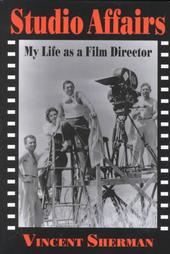Vincent Sherman had a solid career as a director, making melodramas (Mr. Skeffington, The Hasty Heart) and films of a darker, noirish hue (The Hard Way, Nora Prentiss, The Damned Don’t Cry). But he should be remembered for his autobiography Studio Affairs, one of the most honest and therefore best books about Hollywood ever written. Let’s get the prurient stuff out of the way, shall we? Sherman slept with several of his leading ladies and details those relationships. The dalliances strangely parallel each actress’s films; Bette Davis’ is histrionic with a tragic ending, while Joan Crawford’s is brazen and tawdry. (His one night stand with Rita Hayworth is simply sad.) What emerges from the telling is an astonishing portrait of a lasting marriage; Sherman’s wife Hedda knew of his affairs and even became friends with Crawford.
Let’s get the prurient stuff out of the way, shall we? Sherman slept with several of his leading ladies and details those relationships. The dalliances strangely parallel each actress’s films; Bette Davis’ is histrionic with a tragic ending, while Joan Crawford’s is brazen and tawdry. (His one night stand with Rita Hayworth is simply sad.) What emerges from the telling is an astonishing portrait of a lasting marriage; Sherman’s wife Hedda knew of his affairs and even became friends with Crawford.
Sherman is every bit as meticulous when it comes to recounting his professional life. Studio Affairs lays bare how many compromises are necessary for a career in Hollywood, how frequently opportunities fade away. Sherman never forgot his training in the B-movie unit at Warner Brothers, where previous years’ prestige projects were repurposed into programmers. (The first half of The Mayor of Hell plus the end of San Quentin became Crime School, Sherman’s first writing credit.) When a projected adaptation of James M. Cain’s Serenade fell apart, he reworked The Letter into The Unfaithful.
After reading the book, I caught up with a few Sherman films on DVD. All Through the Night (1941) was of particular interest; Humphrey Bogart in an anti-Nazi action comedy? He plays gambler Gloves Donahue, whose efforts to find out what happened to his favorite cheesecake – I am completely serious – lead him to a ring of fifth columnists. Bogart’s gang includes Jackie Gleason and Phil Silvers. And yet somehow, the movie is leaden from the jump. Honestly, it’s dreadful. I only kept watching because I was convinced it had to get funnier.
Still, it does produce my favorite story in Sherman’s book. Peter Lorre, as one of the Nazi spies, has to shoot a lock off a door while Judith Anderson hollers in German behind him. When Sherman requested a second take, Lorre says, “That’s all, brother Vince. I can only do this kind of crap once a day. Besides, it’s six o’clock. Time to go home.” (Can’t you just hear Lorre saying that?) Sherman asks how, if that’s true, Lorre could have made all those Mr. Moto pictures. Lorre retorts, “I took dope!” Later, Sherman learns that Lorre wasn’t joking.
Next up was the movie that cemented Sherman’s reputation. Underground (1941) was meant to be a B-picture, but a strong script and Sherman’s direction made it a surprise hit. A wounded Nazi soldier, loyal to the party, returns home, not realizing that his older brother is a leader of the resistance. They are quickly set on a collision course.
Propaganda? You bet. Effective? And how, especially that ending. The idea that this movie was in theaters months before Pearl Harbor boggles the mind. First and foremost, though, Underground functions as a gripping thriller.
Another good Sherman story: the role of an elderly man who aids the resistance was reconceived for the gorgeous Mona Maris because she was “friends” with the film’s producer – and if he didn’t cast her, she was going to cut up all of his suits. Maris is terrific in the movie, but Sherman never bought her in the part.
skip to main |
skip to sidebar
Twitter

Movies. Crime fiction. Baseball. Jazz. Cocktails.
MY SUBSTACK
Subscribe to Cocktails and Crime: https://vincekeenan.substack.com/
About Me
- Vince
- One-half of classic Hollywood mystery writer Renee Patrick (DESIGN FOR DYING, DANGEROUS TO KNOW, SCRIPT FOR SCANDAL, THE SHARPEST NEEDLE, IDLE GOSSIP). Tippling gadabout. Author of DOWN THE HATCH: ONE MAN'S ONE YEAR ODYSSEY THROUGH CLASSIC COCKTAIL RECIPES AND LORE, available at Amazon. Editor, the Film Noir Foundation's NOIR CITY magazine.
Email Me!
vince (at) vincekeenan (dot) com